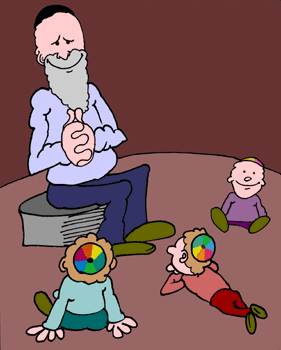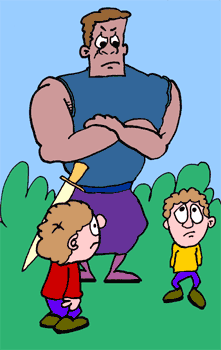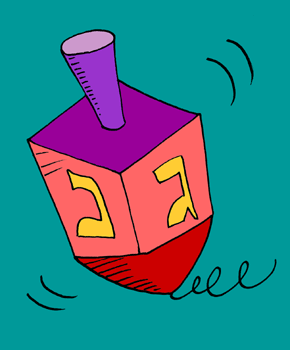 Identifying as a Jew
Identifying as a Jew


7 min read
A story that takes place in one of the caves where Jewish children would meet their rabbi every day to learn and study in secret.
Over two thousand years ago, during the time of the Second Temple, when the city of Jerusalem had been taken over by the Greek army, many Jewish families in the Judean Hills of Israel had to live in caves.
These were difficult times. The Greeks were persecuting Jews everywhere. Day to day living was just not the same anymore. The only Jews who were allowed to stay in the city were the ones who agreed to become like the Greeks.
The Jews who didn’t want to become like the Greeks were living in fear of being caught by the soldiers and forced to live like non-Jews. They weren’t allowed to observe Shabbat anymore. They weren’t allowed to keep to the Jewish calendar anymore. And worst of all, Torah learning was forbidden. The Greeks wanted the Jewish people to forget everything they ever learned about being Jewish.
However, there were Jews who just wouldn’t give in. To accept the Greeks new rules would be like saying, "Being Jewish doesn’t matter." Those people felt that no matter what, it was very important to stick to Jewish law and live a Torah life as the Jews had done for so many generations already. If they would give up, then the Jewish People could be totally wiped out and forgotten about.
Our story takes place in one of those caves where Jewish children would meet their rabbi every day to learn and study in secret.

"Today we will learn about Joseph," smiled Rabbi Shmuel as he taught the class of kids a Torah lesson. "The Torah tells us that Joseph was falsely accused and thrown into jail. There were two other prisoners in the jail with him, the King’s wine steward and the King’s baker. The wine steward was put into jail because he served a cup of wine to the King that had a fly inside. The baker was jailed because of a small pebble that was found in the King’s bread."
The children loved their teacher very much. He was very nice to them. They would sit with writing boards and chalk. As he would teach them they wrote down notes of what he said.
"Rabbi Shmuel, Rabbi Shmuel," interrupted Ephraim who came running into the cave with his friend Eliezer. "They’re coming! A whole group of Greek soldiers are on their way up the path. We saw them! We saw them!"
"Okay," said Rabbi Shmuel with confidence. "Everything is going to be alright. Quickly, everyone put their writing boards away now, and start playing games. Ephraim and Eliezer, go back outside and play near the entrance to the cave."
"Okay Rabbi Shmuel," said Ephraim and Eliezer as they nervously headed for the cave entrance.
"Ephraim, here they come, they’re getting closer!" said Eliezer full of terror as he looked down the path. "Look at their short dresses and swords. What are we going to do if they ask us questions?"
"Don’t worry, I’ll take care of that," said Ephraim.
The soldiers approached the two boys. One soldier said to the head soldier, "Here they are. This must be the place where Torah learning is going on." The head soldier called out, "What are you doing here you boys?"
"Don’t you see, sir?" answered Ephraim with respect. "We’re just playing."

"Do you know who lives in this cave?" shouted the soldier.
"Sure," said Ephraim with confidence. "Shmuel ben Yehuda. He lives here with his family."
"Hey," called out one of the other soldiers, "I hear voices of children coming from inside."
"Why are there so many children inside that cave?" asked the head soldier.
"Oh, they are the friends of Shmuel's children," answered Ephraim. "They have come to play together."
"Then why aren’t you two inside there with them?" shouted the Greek soldier.
Ephraim wasn’t ready for such a question. He became nervous and was afraid the soldiers would realize that the kids were really studying Torah, a clear violation of the Greek rules.
Then little Eliezer spoke up for the first time. "We came outside to play because we were upset with the others. We don’t want to play with them anymore."
"Ah ha," said the soldier. But it seemed like he didn’t buy their story. Without any further notice, he barged into the cave, in anticipation of catching the little hoodlums learning Torah. To his surprise, he found them all sitting on the floor in pairs spinning tops that are called dreidles. There was a small pile of nuts in the middle of the floor that was used as the kitty. The dreidels were made out of wood and had four sides to them. Each side had a Hebrew letter written on it.
By this time the head soldier was getting a little upset with his comrades. "Gregory, why did you bring me here? These kids are just playing games!"
"We were sure that they were learning the Torah," said Gregory, the younger soldier. "Our secret intelligence service said that in this cave, Jews are breaking the Greek rules.
"Well, maybe there is some secret about those little tops they are playing with," wondered the head soldier. "Hey you," he called to one of the kids. "Give me that top you’re playing with. What do these letters mean?"

"Oh," said the boy. "They’re just the initials of different names of the children. The letter Nun stands for Nachman, the letter Gimmel stands for Gedaliah, the letter Yud stands for Yehuda and the letter Pey stands for Pinchas."
The head soldier was fed up. "Gregory, you’ve wasted my time. I had to come all the way up here to find kids playing children’s games?! Why I could have been doing something much more important with my time." The soldiers all left the cave and started down the path.
Rabbi Shmuel smiled and told the children, "You see kids, the danger has passed. We’re alright. Tell me," inquired Rabbi Shmuel, "what is the real meaning of those letters you wrote on the sides of the dreidels?"
Eliezer came forward and said, "Nun, Gimmel, Yud and Pey." They really stand for, Nes Gadol Y’hiyeh Po. A great miracle will happen here."
"Amen," said Rabbi Shmuel. "May your words come true. We will need a miracle to overcome the Greeks."
Since the miracle of Chanukah so long ago, children have always played with dreidels during these eight days. One slight change, however, is that instead of the letter Yud, the letter Hey is written. Instead of saying, "A great miracle WILL happen here," we say, "A great miracle HAPPENED here."
dreidels that are used outside of the land of Israel also have one slight change. The letter Shin replaces the letter Pey. Instead of: A great miracle happened HERE, the dreidel reads: A great miracle happened THERE.
Discussion Questions:
Q. How do you think the Jewish people felt about keeping the Torah secretly? Wouldn’t it have been much easier to simply give up and be like the Greeks?
A. When something is important to us, we stand up for it, even if it means being inconvenienced. Certainly the easy way out would have been to forget about their Jewishness, but it was important to them and they realized that the future depended on it.
Q. Why do you think the Greeks picked specifically on the things the Jews did -- like Shabbat, keeping the Jewish calendar and Torah learning?
A. These particular observances are critical to Judaism. The Greeks goal was to uproot Judaism by getting the Jews to assimilate, so they made decrees against these major areas. Torah learning is the basis for everything Jewish. Shabbat because it is the one day of the week that we demonstrate God as the Creator of the world. And just as the world was created in 6 days, but on the 7th day there was no creation, so too the Jewish People take this day off to rest and think about life and the world. By keeping the Jewish calendar, the Jews stick to their own holidays. All of these things are saying, stay Jewish.
Q. How would you feel and what would you do if the U.S. government outlawed Judaism? (This was done in recent years, in the Soviet Union!)
Q. Have you ever experienced any anti-Semitism, like from bullies at a park, or at your school? How did it make you feel?
